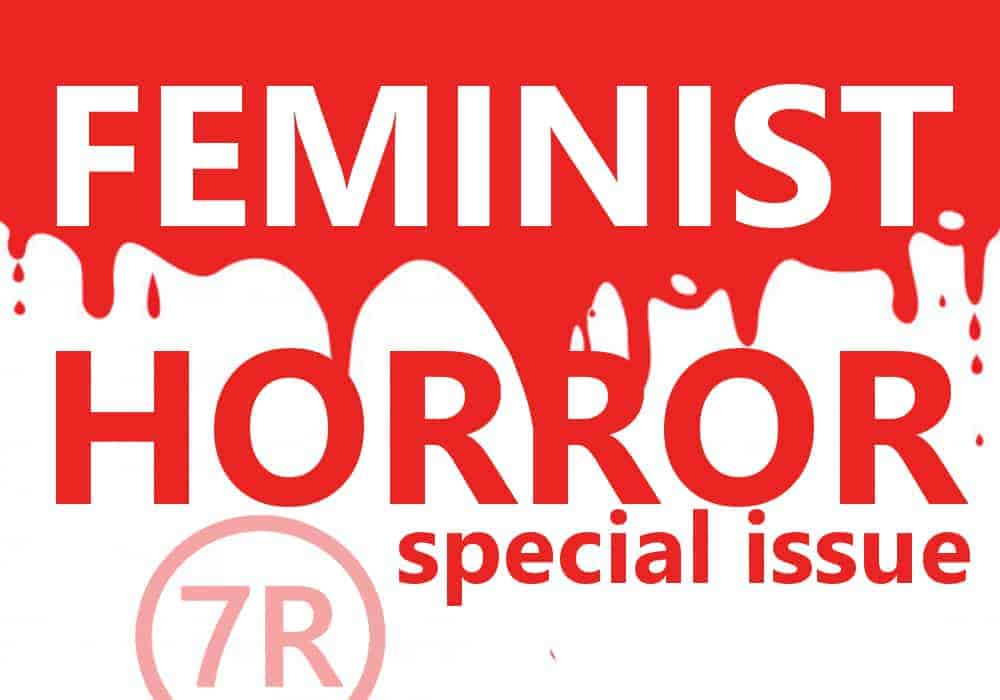We are seeking pitches for our Special Issue about feminist perspectives on horror cinema. If you’d like to write for us, this is the best way to get started: this issue will be a launchpad for new talent at Seventh Row.

By focusing on films directed by and / or focused on women, as well as smaller festival films which too often slip through the cracks, we at Seventh Row seek to challenge the often sexist and generally unfair conventions that dictate which films are good and deserve to be seen. Questioning outdated assumptions about genre cinema — those implying that horror is an inherently low art, or one in which women cannot thrive — falls right in line with that mission statement.
Although several of the films we have written about in the past few years contain genre elements and play with horror tropes — Joachim Trier’s Thelma and Olivier Assayas’ Personal Shopper are two examples — we have so far only rarely addressed films which unambiguously belong to the genre. This is bound to change with our first ever horror pitch brief, one asking for articles about horror films from a feminist perspective. This Special Issue — composed of at least 5 articles — is set to be published online around Halloween 2018.
Send us your pitch by July 31 at 11:59PM ET.
Before sending us your pitch, make sure you read all of the following to have a clear idea of what we are asking for.
How are we defining ‘feminist horror’?
‘Feminist horror’ is a broad term to be understood as a general direction only. What matters to us the most is for your idea to be truly original and well-argued.
If your pitch is interesting, we are willing to be flexible about the definition of horror cinema itself. For example, we could see a way in which Sam Peckinpah’s siege / family drama Straw Dogs could be considered a horror film.
Most importantly, this call for pitches shouldn’t be misunderstood as a general hunt for horror films that are feminist! What we are interested in is a feminist approach to horror cinema: if you want to write about a horror film that is feminist, that’s great! But you can also write about the sexism of a horror film. We would particularly love articles about how you enjoy a horror film despite how sexist it is: the genre is understood as being generally misogynist, but we know that there are many fans who are women.
We do not generally accept pitches on older films — meaning, films that came out more than one or two years ago — but in the context of this Special Issue, we welcome a modern feminist perspective on an older film, set of films, actor, director, etc.
Moreover, we want this issue to be an opportunity to revisit films that slipped through the cracks, that are underappreciated, or that are ripe for a (feminist) reappraisal or critique.
Most importantly, we want original ideas. That means we do not want a piece about how Buffy is actually a feminist show — unless your argument is truly unique.
If you have an idea but are not sure that it fits the pitch, do not be afraid to check with our editors!
What should your pitch look like?
We want to work with you to develop and craft a piece specifically and uniquely suited to Seventh Row. Because we value the editing process and our relationship with our writers, we do not accept submissions of pieces already written.
Your pitch should be concise, but clear and detailed. Although we are aware of the way an article often becomes something different during the writing and editing process, and welcome such developments, we want to make sure that we do start from a specific idea. You should strive to outline your piece and its arguments as clearly as possible. Before you set your pen to paper, our editors will exchange emails with you to make sure you have actual arguments, as opposed to a vague desire to write about a certain topic or film.
Send your pitch to feministhorror [at] seventh-row [dot] com by July 31 at 11:59PM ET. Please use the subject line: “Feminist Horror Pitch: [Title of your pitch]”
Please include in your pitch email a few clippings of other pieces you have written.
Who should pitch?
This Special Issue is intended as an entry point for writers looking to contribute regularly to Seventh Row, and we are especially looking for writers who are interested in a long-term collaboration with us. For more information on the advantages of developing a true relationship with Seventh Row, check out the next section ‘What is it like writing for 7R?’
We encourage pitches from women, BAME, and LGBTQ+ writers, but will be considering all pitches equally.
Before you send us your pitch, know that the experience of writing for 7R will probably be different from that of any other outlets you might have written for.
What is it like writing for 7R?
Our editing process is purposefully intensive: every article goes through several drafts (though not necessarily complete rewrites, as it is sometimes understood) which explains the early deadline for pitches. Yet this editing process is not aimed at destroying our writers’ unique style and voice. On the contrary: we push our writers to push themselves, to fully develop their ideas and express them as clearly and concisely as possible, and to develop a writing style that is clear rather than flowery — to write articles which actually have something to say.
With the current precarious state of film writing, many outlets cannot afford to allow for much editing; when they do, the editor rarely consults the writer at all. Editing at 7R is a collaborative process — and we don’t bite! We do not want our writers to accept all our edits without saying a word: we expect them to push back when they disagree and to explain themselves. Editing should be a conversation, so we need to know what you are thinking; our edits are a way to let you know what we are thinking. It might seem needlessly difficult at first — someone else at another publication wouldn’t edit at all — but this is how breakthroughs are reached, how a writer comes to untangle their thoughts, to develop self-esteem and a unique voice.
This is also a unique chance to develop a true relationship with an outlet and an editorial team. All our regular writers at 7R have their own, unique voice, which we’ve come to understand and see grow over time. Such relationships of understanding and mutual support are increasingly rare in the world of film writing, but precious in the construction of a writer’s specific voice. Writers selected through this pitch will be encouraged to write other articles for us, and hopefully to become regular 7R contributors.
We have put in place several tools to make the editing process as smooth as possible.
- In a one-hour workshop over Skype, the selected writers will be able to ask any questions they might have. To familiarise them with our editing process, our editors will break down the editing of a recent 7R piece from draft to draft — looked at this way, it really isn’t as daunting as it might sound.
- Before writers put any words on the page, our editors will make sure that their argument is well developed. Via email, Skype, or Slack — whatever makes the writer most comfortable — the writer will discuss with one or several of our editors, breaking down the general arguments of the suggested piece they want to write.
- The goal of this workshop is to create a creative relationship with the writer, one where they will get to grow and improve in a major way from piece to piece. Thus we encourage real communication, either on Slack or via email, and even Skype when necessary. We love talking to our writers, and our goal is always to help them.
Payment?
Although we are working on it, we are not yet able to pay our writers and editors a fee. However, we will turn our issue into an eBook for sale at the Seventh Row shop. All contributors will be entitled to royalties in proportion to their contribution to the eBook. In the meantime, we offer the tools and the space for dedicated writers to improve on their writing, and a chance to develop a real relationship with a team of experienced, empathetic editors.

